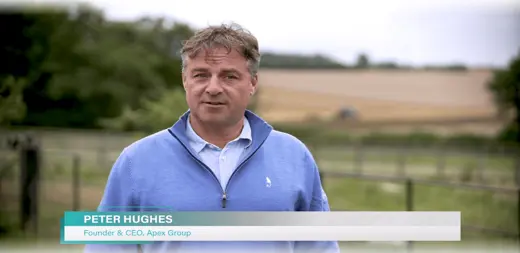With days to go before the COP26 climate change summit in Glasgow, the UK government has thrown down the gauntlet to other nations by announcing what it sees as a new “world-leading” set of standards for a greener and more sustainable financial system.
The roadmap sets out plans for new and existing Sustainability Disclosure Requirements (SDR) that aim to ensure businesses and investors have the right information to understand and act upon any climate-related risks they might face and create as part of their investment decisions.
The report, entitled Greening Finance: A Roadmap to Sustainable Investing, highlights the crucial role that the financial sector plays in a commitment made by the UK government earlier this year to cut emissions by 78% by 2035 compared to 1990 levels.
“The Intergovernmental Panel on Climate Change (IPCC) is clear that immediate, rapid, and large-scale reductions in greenhouse gas emissions are needed,” Rishi Sunak, the UK Chancellor said as part of this announcement. “This transition cannot be achieved without a significant shift of investment into sustainable projects and green technology. The financial system is therefore critical to achieving net zero and protecting the UK’s natural environment.”
Public pressure around impact investing has a large part to play in bringing about this change, with 70% of the UK population stating they want their money to go towards making a positive difference to people or planet. Research by the Investment Association shows the market is responding, with 49% of the £9.4 trillion in UK assets integrating ESG data into their investment processes in 2020, up from 37% in 2019, but clearly still well short on public expectations.
One of the issues the new framework seeks to address – which will also apply to pension schemes, investment products and asset managers and owners – is the lack of agreement on the definition of ‘green’, leaving investors and consumers confused about how sustainable a business or product really is and giving rise to concerns around so-called ‘greenwashing’.
A key part of delivering on that better understanding and greater transparency lies in the need for firms to commit to collecting and measuring more meaningful and accurate data.
In summary, the UK government’s framework sets out four key focus areas for the UK financial sector:
- Getting the right information to market participants
- Defining what counts as ‘green’
- Being a responsible steward of capital
- Leading international efforts to ‘green’ finance
A more detailed summary of those is included below. If you would like to find out more about our ESG Ratings and Reporting services, or want to speak to one of our experts about the new UK government roadmap, contact us here.
|
1. Getting the right information to market participants |
|
|
UK Sustainability Disclosure Requirements (SDR) |
Whilst the UK implemented TCFD aligned disclosures across UK premium listed entities and recently proposed to extend to asset managers, life insurers and pension providers, the UK announced plans to implement the UK Sustainability Disclosure Requirements (SDR) creating an integrated framework, a global standard covering: Corporate Disclosure The current IFRS Foundation will be establishing an International Sustainability Standards Board (ISSB) developing baseline reporting standards for sustainability. The ISSB are anticipated to be a backbone of the SDR corporate reporting regime. The ISSB is anticipated to build on the 4 pillars of the TCFD- i) strategy, ii) Governance, iii) Risk Management and iv) Metrics and Targets Asset Manager and Asset Owner Disclosure New requirements for asset managers and asset owners that manage or administer assets on behalf of clients and consumers (including occupational pension schemes) to disclose how they take sustainability into account. These will help consumers determine whether their assets are managed according to their sustainability preferences. Investment Product Disclosure New requirements for creators of investment products to report on the products’ sustainability impact and relevant financial risks and opportunities. This information will form the basis of a new sustainable investment labelling regime that will make it easier for consumers to navigate the range of investment products available to them. The SDR will also provide wider information beyond financial risks and opportunities and examine how firms impact the environment. |
|
Economy Wide Metrics |
The SDR will apply the same metrics across the economy thus ensuring and augmenting comparability of data, providing ease and simplicity of information to investors, mitigating greenwashing. |
|
Sustainable Investment Labelling Regime |
The FCA is working with HMT to develop sustainable investment labels supported by SDR disclosures- such labelling will cover product objectives, policies and strategies and also how investments are allocated. |
|
SDR disclosure of Transition plans |
An increasing number of firms are making commitments to reach net zero emissions and develop transition plans. The SDR will require disclosure on such transition plans – initially a ‘comply or explain’ basis until further disclosure requirements are embedded into regulation. |
|
ESG data providers and digitization of reported information |
With the increasing significance of ESG ratings, data providers and the integrity of their data raises issues of conflicts of interest and governance, such providers may be brought in scope of regulation by the FCA. Further to the criticality of ESG data, regulators are also considering digitization of ESG data and the potential scope of a centralized register of ESG data. |
|
2. Defining what counts as ‘green’ |
|
|
UK Green Taxonomy |
The lack of an accepted definition of which economic activities count as environmental sustainability exposes the market to greenwashing. The UK government is introducing a UK Green Taxonomy to address this. The UK Green Taxonomy will define which economic activities are considered environmentally sustainable and therefore ‘Taxonomy-aligned’ Reporting against the Taxonomy will be part of the SDR. The Taxonomy will also include Enabling Activities. This recognizes activities which currently support the transition by enabling substantial contributions to environmental objectives in other sectors, but which are not yet sustainable themselves. This will include, for example, the manufacture of components for wind turbines. |
|
Taxonomy Disclosures |
Certain companies, and providers of investment funds and products will have to disclose which proportion of their activities are taxonomy-aligned. The aims being to: i) Create clarity and consistency for investors; ii) Improve understanding of companies’ environmental impact; iii) Provide a reference point for companies |
|
Taxonomy Aligned |
There are 3 tests to be met to be Taxonomy-aligned: · Make a substantial contribution to 1 of the 6 environmental objectives; · Do no significant harm to the other objectives; · Meet a set of minimum safeguards |
|
3. Being a responsible steward of capital |
|
|
“Stewardship is the responsible allocation, management and oversight of capital to create long-term value for clients and beneficiaries leading to sustainable benefits for the economy, the environment and society.” – Financial Reporting Council (FRC) ‘The UK Stewardship Code 2020 The UK’s pensions and investment sectors (asset owners, asset managers, and the service providers that support them) have a role to play in responsibly allocating capital and making use of their ownership rights and influence over investee companies, whilst fulfilling their fiduciary responsibilities. It is expected that companies will use information generated by SDR to deliver on their responsibilities as stewards of capital across all asset classes and markets given that stewardship can be a powerful vehicle to hold companies to account for the feasibility and credibility of their net-zero commitments, and their transition strategies to align their business models with a net-zero economy. Investors also decide how capital is allocated, for example to companies and technologies that contribute to these ambitions. |
|
|
4. Leading international efforts to ‘green’ finance |
|
|
The UK government continues to participate in international forums to lead international efforts by leading in the implementation of its own strategy. |
|




